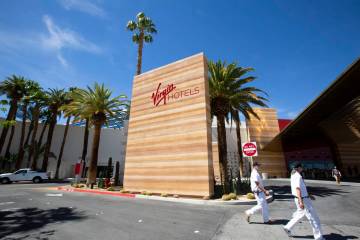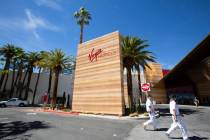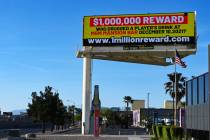Exec with ‘hustle’ helps drive Las Vegas convention-tourism business
It's easy to see how Las Vegas Convention and Visitors Authority President and CEO Rossi Ralenkotter identifies with retired baseball star Pete Rose.
Ralenkotter's office at the Las Vegas Convention Center is a virtual shrine to his favorite team, the Cincinnati Reds, and its Big Red Machine identity, that included Rose, who played with the nickname "Charlie Hustle."
In the convention and tourism business, Ralenkotter is the industry's Charlie Hustle.
While the Convention and Business Authority wrestles with a plan to expand and upgrade the Convention Center campus to the tune of $2.3 billion, a committee Ralenkotter formed plans to unveil a new transportation plan, and a state committee formed by Gov. Brian Sandoval works to develop a tourism infrastructure strategy, Ralenkotter is gearing to discuss a new five-year "vision plan" with the 14-member LVCVA board of directors.
He will outline details of the vision plan at the board's Jan. 12 meeting.
Is there too much on the LVCVA's plate at one time? Shouldn't something be completed before tourism leaders head into the next project?
To Ralenkotter, unveiling the vision plan is not only timely, but it's essential to the overall coordination of every project and strategy on the LVCVA's agenda.
"This five-year plan coincides with the level of competition that's occurring in the marketplace and the changing demographics of visitors in general," Ralenkotter said in a recent interview. "It positions us to be where we want to be five years from now."
The five-year plan
Projecting where one wants to be five years from now is a daunting task, but it's even more challenging when one considers all the competitive forces in play.
Las Vegas finds itself in the in the cross hairs of competitors attempting to snatch some of its trade show and convention business. Cities like Chicago and Orlando, Florida, have made no secret of their desire to relocate some of Southern Nevada's most valuable trade shows to their cities, and they're backing up the desire to take them with new investment in their own facilities.
Chicago has expanded the nation's largest convention facility, and Orlando is set to unveil a new maglev transportation system that will link Orlando International Airport with the city's convention corridor, erasing Las Vegas' advantage of having its airport within minutes of its key facilities.
The heated competition is why the LVCVA pressed for the Las Vegas Convention Center District plan, which included the surprising and controversial acquisition of the Riviera acreage as the new front door to Southern Nevada's convention center assets.
Chicago nearly stole the International Council of Shopping Centers' ReCon commercial real estate trade show, and Orlando made a play for taking the Wranglers National Finals Rodeo away. Ralenkotter and his team assured meeting and convention planners of Las Vegas' efforts to upgrade its facilities.
Representatives of the real estate show, the Consumer Electronics Show, the National Association of Broadcasters and other show planners testified before the governor's Southern Nevada Tourism Infrastructure Committee that they were serious about looking elsewhere if Las Vegas couldn't retain its edge as a world-class host.
They also noted that the competitive field was no longer just in the United States, but worldwide.
And that plays into the LVCVA's initiative to boost itself as an international destination with a goal of attracting 30 percent of its visitors from foreign countries.
The LVCVA is working with McCarran International Airport on that initiative, which entails recruiting international air carriers to consider Las Vegas as a destination for its customers. Ralenkotter noted that McCarran's announcement earlier this year that it would convert seven domestic gates to international use with a $51 million tunnel project would go a long way toward achieving the 30 percent international visitation goal.
New breed of traveler
The city's convention and visitor marketing experts have joined other destination marketing organizations in determining the best way to attract a new breed of traveler — the millennial.
"The baby boomers are transitioning from the workplace into the retirement phase, and as a result, they've changed their travel habits," Ralenkotter said. "Millennials are looking more toward the experiences they have when they travel, and we have to recognize that what our customers want is changing."
He said there have already been some innovative changes in attracting millennial visitors with the growth in pool party day clubs at resorts and the sudden abundance of festival sites for outdoor music and food events, inspired in part by the success of the Las Vegas Motor Speedway hosting the Electric Daisy Carnival every June.
The future of Las Vegas' transportation infrastructure also is a part of the equation. Both international travelers and millennials are more comfortable than their baby boomer counterparts with mass transportation. It's expected that when Ralenkotter's transportation committee and the governor's infrastructure committee issue their findings, more efficient mass transit from the airport to the resort corridor will be on the list of needs.
With all those projects and strategies in play, Ralenkotter believes now is the time to talk about a vision plan.
The last time the LVCVA developed what was then a three-year vision plan, Las Vegas was just starting to emerge from the Great Recession. Recovery was the key to that plan, which included initiatives not only to boost visitation but to improve average daily room rates and revenue per available room, which both continue to lag pre-recession levels.
When Ralenkotter discusses the vision plan, he also will include a review of the LVCVA's organizational structure and open a dialogue on succession plans — a strange conversation, considering Ralenkotter has been with the LVCVA for more than 42 years.
"We'll talk about what we need to have and the process of how to do it," Ralenkotter said. "Do we need to change the purpose of a staff position? Do we need to add staff? I think we're going to need additional sales people and, with everything we'll have going on, more management and oversight."
No retirement plans yet
Ralenkotter, 68, said he has no immediate plans to retire, but it's his responsibility to have someone available to take the reins when that time comes.
"My responsibility is to develop the executive group and anyone else within the organization that has the potential to move up and succeed me," he said. "Those who have an aspiration to do that should have the means provided. I've always been an advocate for promotion from within."
Noting that the LVCVA is one of the few destination marketing organizations that not only sells the destination but manages a facility to house conventions and trade shows, Ralenkotter said it's important to have executives who understand both sides of the organization's mission.
"It's critical to have a strong team in place and a strong bench for what we do," Ralenkotter said. "It'll make us a stronger organization if cross-training is a part of it."
It sounds like something Charlie Hustle could get behind.
Contact reporter Richard N. Velotta at rvelotta@reviewjournal.com or 702-477-3893. Find @RickVelotta on Twitter.








































